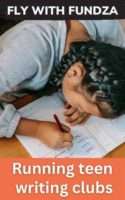Research has found that young South Africans are still not developing reading and writing skills that they need for personal and academic development.
Like most things, the more you do something, and the greater your confidence gets as you get familiar with it, the easier and more pleasurable it becomes. The same goes for reading and writing.
However learners at primary and high school are not doing enough writing to develop their writing ‘muscles’ – not the muscles in their hands, but the muscles in their brains!
In primary schools learners spend much time filling in words in worksheets, or filling in missing letters or selecting the correct answers. So they do not spend much time actually writing whole original sentences themselves. At high school, with the packed curriculum, learners do not get time to write for extended periods.
School writing
And the times when writing is required at school, it often becomes a chore that has to be completed, not something that communicates meaning. Learners get marked for it, and often get despondent at all their mistakes – reinforcing the idea again that writing is something to be measured, rather than crafted and enjoyed (as the poem in the next chapter demonstrates). This means that many learners do not enjoy writing, and do not develop their abilities in any depth.
This obviously has a negative impact on their academic achievement. And more than that – writing is not only essential for academic success, but can be a powerful tool for self-development. It can help us explore and extend our own thinking, and can also in some cases be therapeutic as we come to understand ourselves better.
Benefits of writing clubs</strong>
A good way to develop our learners’ writing in safe and comfortable spaces is to run a writing club, where the focus is on the content, on enjoyment, on personal expression, and not on marks and assessments. This safe space can offer a rare time where learners are able to bring their whole selves to the process, and can affirm their identities, issues and experiences – something that is not easy to achieve in the demands of a busy school day, and yet is so beneficial for authentic educational experiences.
This book will introduce activities to use for writing clubs at high schools. However the approaches used can also be very successfully implemented in lessons as well.
Using scaffolding or models
You will notice that a lot of these activities offer ‘scaffolding’ – patterns that learners can then follow to create their own pieces. Others offer model texts – examples of pieces that the learners can be inspired by. Using these kinds of texts can be useful in clubs as well as classroom situations.
Sometimes teachers worry that learners may ‘copy’ and follow the model too exactly. However what can happen is that weaker learners may follow the model quite closely – which does help them improve their writing – and stronger learners are more confident about launching off on their own. None of us are born knowing what a poem or an essay looks like, and the more we are exposed to good ones, the more our own imagination can develop and grow.
Focus on craft
Another useful principle of writing for pleasure is the focus on the craft, on discussing what makes writing effective, and what techniques the writer uses. This can help learners go back to their own work to see what they can apply to improve their writing too. It also helps to create a community of writers, with peers being able to comment and support each other’s work – another very beneficial aspect of developing writing skills.
These approaches – using model texts and analysing what good writing is – and others included further on in the book, such as freewriting – don’t have to be limited to just writing clubs, but can be applied to any classroom writing activity, including those required by the curriculum.


